Is the Ivy League unreachable? One educator is changing what RI students think possible
In the fall, I sat in on a Brown University Law and Literature class. But the class wasn’t being taught on College Hill to Brown students. Instead, it was being held 4 miles north, at Central Falls High School. The course was Brown’s first in partnership with the National Education Equity Lab, which enlists universities from across the country to provide college-level classes to high schoolers from historically underserved communities.
In the classroom that day, Deloris Grant — a longtime and beloved Central Falls High School English and drama teacher — was prompting her students to brainstorm ideas for their final project. Grant serves as co-teacher and facilitator for the Law and Literature course, which has the same syllabus, assignments and college credit as the course taken by Brown students.
“It’s going really well,” she said. “It’s an excellent fit.”
For this hybrid course, Brown’s professor records video lectures (with opportunities for live Zoom discussions throughout the semester) while a teaching fellow — or, “near peer” — from Brown meets with the high schoolers each week, virtually.
Women in Action: RI food entrepreneur Sterling Clinton-Spellman is cooking up new restaurant, jobs program
Woman in Action:Barbara Papitto is invested in reducing barriers for people of color
“When Grant told us we were the first school in Rhode Island to do it, it made me feel like ‘Wow!’” said 12th-grader Alexis Ambers, one of the students recruited for the course. “Just because we’re from Central Falls doesn’t mean we’re ghetto or hood. We’re also appreciated, because Brown looked at us to do it.”
Alexis’ enthusiasm for the Law and Literature course goes to the very heart of Soljane Martinez’s work. As education coordinator for Brown University’s Annenberg Institute for School Reform, Soljane works tirelessly to meet the needs of local K-12 schools and community organizations with the vast resources at Brown.
“We want to be able to offer the opportunity for students to build that confidence that, ‘Hey, college is for me,’” Soljane said, referring to the pilot program. “To be able to say at age 16 or 17, ‘I got credit from Brown University. I passed this course.’”
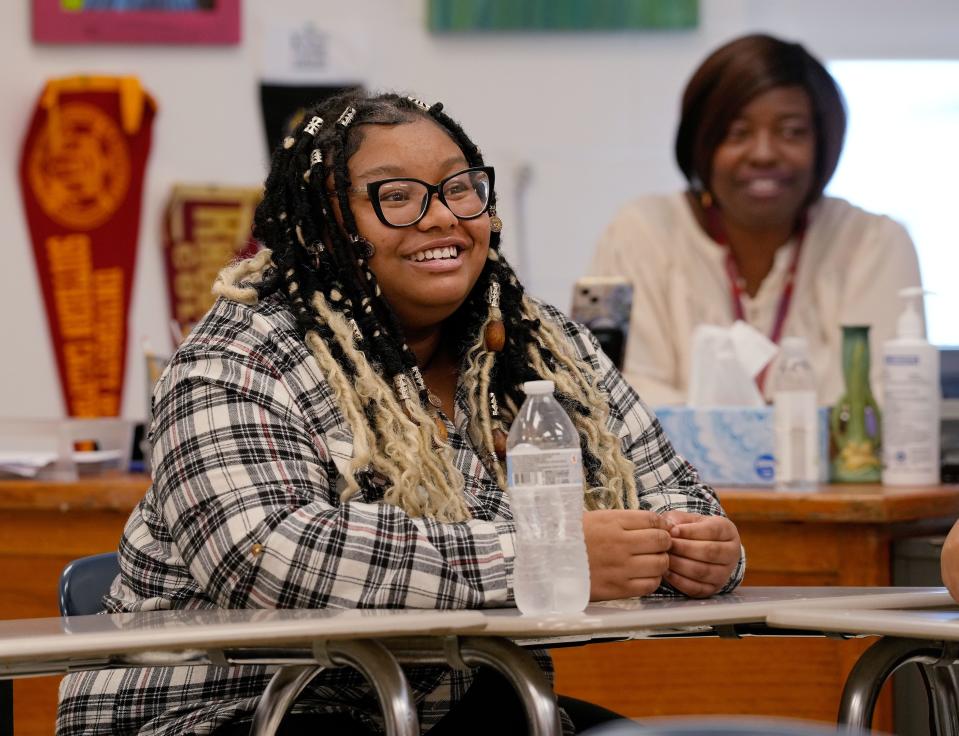
Women in Action:Bringing long-overdue inclusiveness to Providence Public Library
Women in Action:One woman's amazing effort to help coastal communities defend themselves from rising seas
Instilling the belief that ‘I can be whatever I want to be.'
Soljane’s role as liaison between Brown and the community is a critical one. Before her position was created in 2019, there was no point person to coordinate the enormous array of existing and ever-evolving K-12 educational outreach, research and programming conducted by Brown faculty and students. Public school officials didn’t have a clear point of contact at Brown, either.
“Building trust and building bridges have been a big part of my world,” she said. “Personally, I’ve always wanted to help break down those trust or intimidation barriers that many of our communities may feel when it comes to universities generally, or Brown specifically. I want to show them that we are accessible. And, that we are committed to disrupting a lot of the inequities that still exist.”
“She’s passionate about helping others,” said her colleague at Brown, Joshua Correa, the communities program manager at the Annenberg Institute. “She’s the best representative that Brown could hope for.”
One of her greatest strengths, she feels, is her background. The fact that she’s Puerto Rican, speaks Spanish, attended public schools in New York City and was even a teacher herself makes her more relatable to the students and schools that Brown is trying to serve.
Women in Action:Ancient grain fuels modern dream for Providence entrepreneur
Women in Action:Clerk of Court Nora Tyer-Witek brings military ingenuity to role
“I am a product of the urban school system,” she said. “I am Latina. I am first-generation. From day one, one of my personal goals in this role was to help put a different face [representing Brown University] and be a connector for many different communities.”
Robert McCarthy, principal of Central Falls High School, appreciates Soljane’s — and by extension, Brown University’s — commitment to “creating opportunities for equity to occur in underserved communities.”
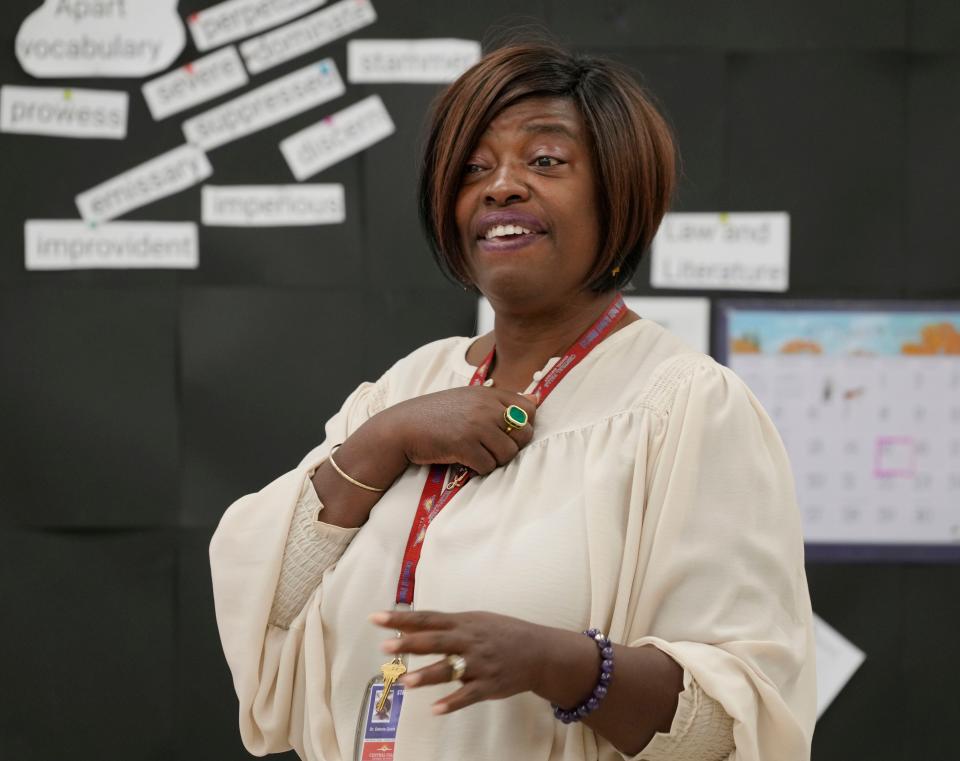
“Soljane understands this community,” Robert said. “She relates to our kids. And, I think, for that reason, it makes her an even more effective advocate for our kids.”
Despite what Robert described as the socioeconomic realities of the largely Latino and Cape Verdean community, he said that Central Falls High School is the most "hopeful" school in which he has ever worked. His students have benefited from a number of Brown programs over the years — from summer sessions at the university’s Warren Alpert Medical School to having teachers who were hired from the university’s master's in teaching program. The relationship has only deepened, thanks to Soljane.
“It goes back to that sense of possibility,” he said. “And, this idea that ‘I can be whatever I want to be.' And, that’s what Soljane’s all about, that belief. There’s no shortage of smart, motivated, intelligent students in Central Falls or any other school. Soljane understands that and works to make sure that our kids get those possibilities they may not otherwise get to do.”
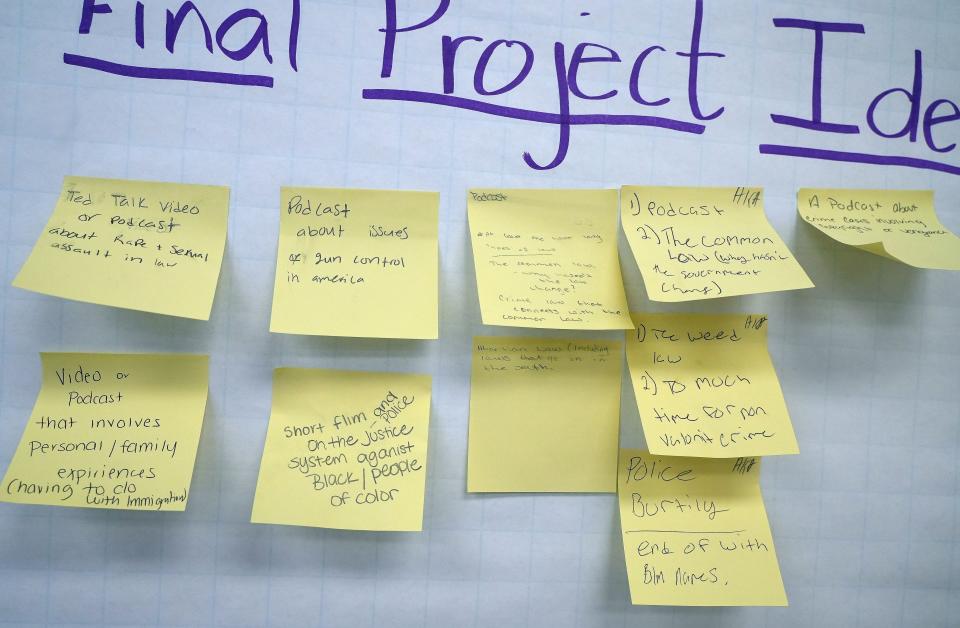
New York City native redefines her identity in rural Puerto Rico
When she was growing up, Soljane’s family was tight-knit. She was born in New York City, living in the Bronx (“a mini Puerto Rico”) and later in Queens. In middle school, the family moved for two years to a rural town in Puerto Rico. There, Soljane went from being “la gringa” — or, the “American” — who came from the mainland and spoke perfect English, to becoming more immersed in the culture of the Puerto Rican countryside.
“Life was simpler,” she said, of the farming community. “I think it kept me grounded as a young person.”
Her childhood was also marked by her parents’ conversion to a Pentecostal denomination. Soljane and her younger sister had to follow a number of strict rules. They couldn’t wear pants, cut their hair or wear makeup or jewelry. They weren’t allowed to go to the movies and could only listen to church music. Their family attended church nearly every day.
Women in Action:Refugee is now a lifeline for other newcomers in RI
Women in Action:No glass ceiling for RI artist Toots Zynsky
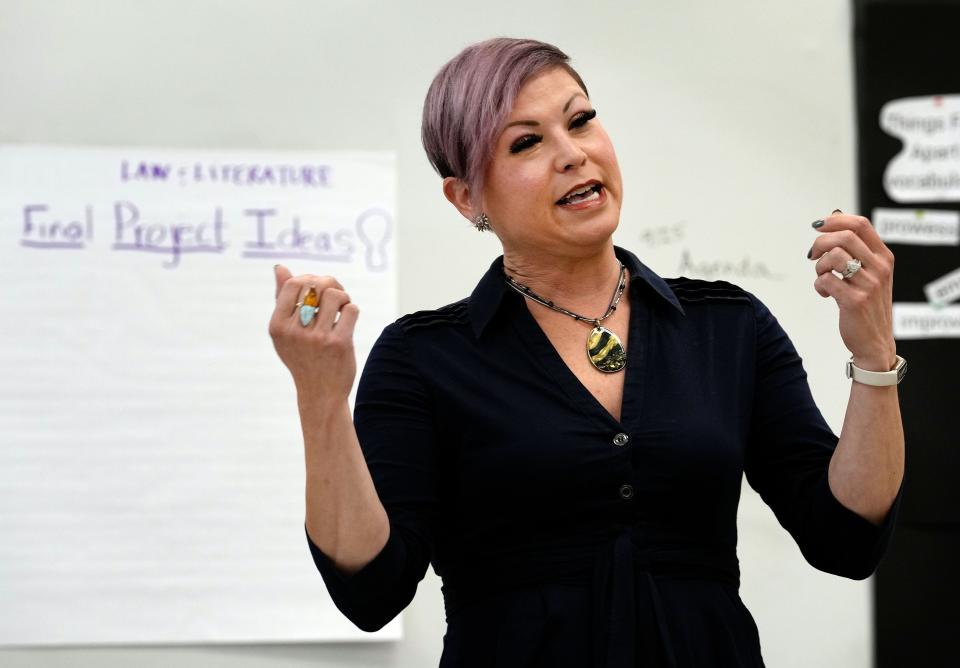
“It impacted me socially,” she remembered. “I looked very different from the rest of my peers. That was tough on my self-esteem.”
In high school she started challenging her parents’ authority, developing her own sense of style. When it came time for college, she knew she wanted to study as far away from New York as possible.
“I wanted to get out from under that grip,” she said. “My father is very strict, very old-school. But, education was always stressed.”
'It was destiny': How a career change saved her life on Sept. 11
She studied journalism at the University of Rhode Island and became involved in “everything under the sun,” including a Latina-based sorority that had a joint Brown-URI chapter. After graduation she spent two years as a reporter for The Providence Journal before moving back to NYC to work at the Wall Street Journal Sunday edition (now-defunct). But in 2001, she handed in her notice at the paper and switched careers to become a teacher. Her fourth day leading a third-grade classroom in Brooklyn was on Sept. 11.
“It was destiny,” she said, her voice filled with emotion. “[The Wall Street Journal Sunday edition’s] offices were in the World Trade Towers. I remember my mother bawling, saying she was so grateful I had left.”
Fortunately, her former coworkers survived. But David Marc Sullins, a family friend and EMT who rushed to save people at ground zero, perished at the scene.
“That changed my perspective about a lot of things, about life and the time we have with our loved ones,” she said.
Since then, Soljane has followed her passion in education — from teacher to dean and principal — to earning her master's and doctoral degrees in education along the way. In her current role, she continues to be committed to creating pathways for students to succeed.
“We’re trying to be proactive, not reactive,” she said. “To understand clearly what it is that the community needs, what they want, and what do we have that can apply.”
Women in Action:Eleanor Dove Harris is a proud advocate for Narragansett Tribe
Mark Patinkin:This RI high schooler is pen pals with a player on the NY Jets. Why it may save his life.
Key goal: Helping students visualize themselves in a college setting
That means supporting and connecting long-standing programs at Brown in math and reading enrichment, earth science curricula, teacher training and so much more, to an expanding number of classrooms across the state. But it also means developing new initiatives, like College Day at Brown, in which public high school students and teachers are invited to a day-long immersive program on campus.
The semester-long Law and Literature course at Central Falls High School wrapped up in December, and Brown is now offering a second course at five schools, including Highlander Charter School in Warren.
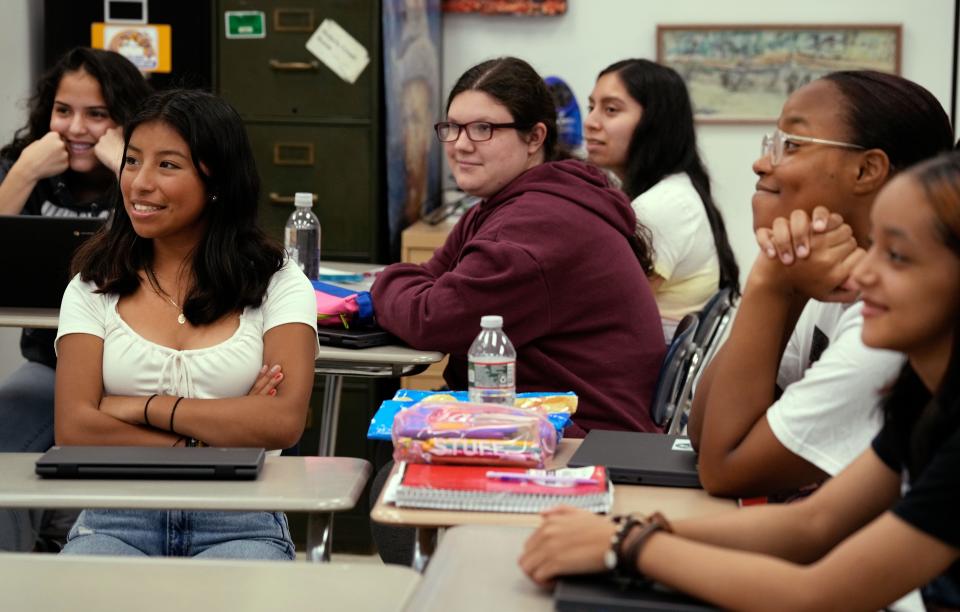
“For a lot of these students, they go to school a few blocks away and they’ve never experienced campus,” she said. “We wanted to make sure they knew that we’re here. This campus is open to you. We want you to see yourself on a college campus, even if it’s not here at Brown.”
As if making Soljane’s point, Central Falls 12th-grader Alexis Ambers says the Law and Literature class, along with her exposure to Brown students near campus, have opened her eyes to new possibilities.
“You can see it is diverse,” Alexis said. “It isn’t just white kids. It’s girls who look like me. Girls who have hair like me, and have their nails like me. So, it’s really pushed me to want to go.”
— Patricia Andreu, a freelance journalist living in Providence, writes Women In Action, a periodic column. Reach her at WomenInActionRI@outlook.com and follow her on Twitter: @ri_women.
This article originally appeared on The Providence Journal: Brown's Soljane Martinez helps underserved students aim for college

